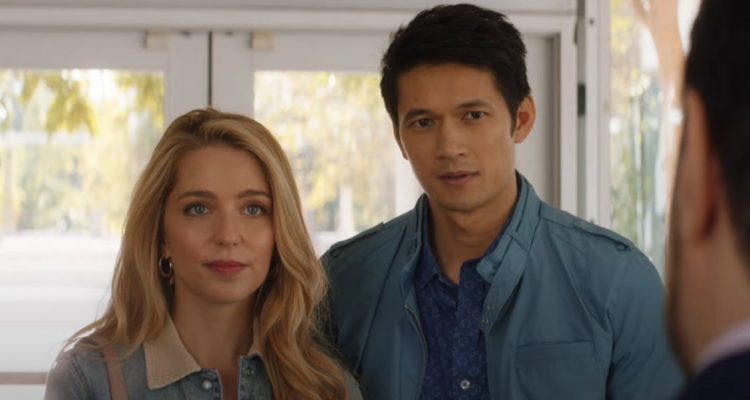Loosely based on the real lives of Solomon Chau and Jennifer Carter, “All My Life” is burdened with a near-impossible challenge of balancing how to honor the subjects the film is based on while also avoiding trite emotional manipulation that often mars this particular romantic subgenre. The film only marginally succeeds. Drawing both from the true story being told – we witness footage from their wedding over the end credits – as well as every other tear-inducing romance where the pair in question is faced with unexpected sickness and loss, the film is a mess of cliches but sprinkled with touches of personality.
The real story it’s inspired by keeps us caring long past the capabilities of the film itself, that small success being more a testament to the devastation of a young couple facing impossible odds than a compliment to the filmmaking. “All My Life” isn’t very good, but the emotional heart of the story is undeniable.
We first meet Solomon (Harry Shum Jr.) and Jennifer (Jessica Rothe) in a crowded, sunkissed bar where they swiftly fall into witty and precise banter as they each try to out-charm the other. We then jump to their first date of jogging in a park and eating zucchini fritters. From there we’re told it’s love at first sight, as the movie accelerates at a rapid pace, rushing through the big moments that defined their love story. Friendship groups merge, Solomon finds solace in work through a connection of Jennifer’s, a song and dance proposal straight from a fairytale showcases their bombastic love – we’re drawn a portrait of a perfect couple. They’re beautiful and intelligent and beloved by all in their circle and, most importantly, we’re endlessly told their love is true. It’s a shame then, that we don’t get more chances to explore each character separately from the other, instead of being led by the film’s focus being so largely committed to them as a pair, rather than individual and fully-formed people.
“All My Life” is an easy film to predict. We know their initial happiness will be interrupted by a health scare and the situation will grow increasingly dire. We know there will be one declarative moment where love triumphs and there will be a low where all that the couple has built becomes threatened. Where director Marc Meyers (“My Friend Dahmer”) falters is in his inability to bring some freshness to the table, relying far too much on the inherent likeability of the characters to provide substance. There’s a vibrancy to the protagonists and their story that the film itself is never able to match.
If there’s a beacon of hope in an otherwise monotonous story it’s the charismatic performances by leads Rothe and Shum. Rothe has already built goodwill following her work in the “Happy Death Day” films, but here, she showcases a welcomed vulnerability and a gift for delivering offbeat humor. She and Shum share palpable, lived-in chemistry and are very often required to perform all of the heavy lifting of the film. The sincerity lies in what they bring to the characters and how they honor the two that inspired the story rather than the screenplay by Todd Rosenberg that is in equal measures as barren as it is overloaded; the script wants to hit every moment and, in the process, sacrifices the in-between beats that would make Solomon and Jennifer human without the aid of Shum and Rothe. The proposal, the big holiday get together, and the wedding are all present and we understand why these “big ones” would be given their moments to shine, but, in the end, it comes across too much like a highlight reel than a fully embodied story.
In Jenn’s voiceover, she mentions that life isn’t meant to be lived later, suggesting that we ought to take our own and live in the moment. It’s a strong sentiment in a bittersweet story that, for all its faults, is still effective in engaging the audience and getting them to root for the couple. That being said, that idea, like all of the declarative moments in the film, creates space without actually filling it. The film wants to elicit overpowering emotions and inspire us to go and live like today could be our last. However, despite the best efforts of Shum and Rothe, it ends up being little more than hot air. The film wants to be a lot of things but the talent behind the scenes isn’t cut out for the task. [C-]

